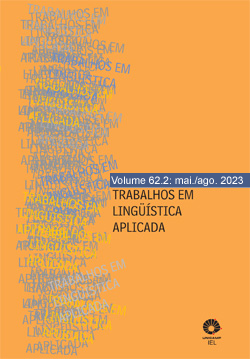Abstract
Although 20th-century scientific discourse disregarded affect as unscientific, and despite this being contested by thinkers such as Nietzsche and Spinoza, only recently could we scientifically argue that affect is inseparable from cognition and building knowledge. This article aims at analyzing how my own practices were embodied and mediated by affect when translating into Brazilian Portuguese the diary of Virginia Woolf. I embarked on it as part of my doctoral research with a concept of “impartiality” in translation that was undermined when I was faced with the diary’s manuscripts. Positioning myself was inescapable after encountering a text I had only known in print and in an impersonal form; a body of work theoretically of private nature, written along 44 years, with its gaps, blots, and oscillating handwriting. This article has the double aim of contributing to studies on translation and affect reflecting on possible ways of using Derrida’s undecidability as a translational strategy, using as an illustration my own process of translating Woolf’s diary, while also helping to reflect on how the affect theory may expand previous considerations made by Woolf herself and other thinkers such as L. Zimmermann, G. Spivak, and H. de Campos.
References
AHMED, S. (2010). Happy Objects. In: GREGG, M.; SEIGWORTH, G. J. (org.). (2010). The Affect Theory Reader. Durham and London: Duke University Press.
ASSEF, M. (2013). Poetas tradutores e o cânone da poesia traduzida no Brasil (1960-2009). Tese de doutorado em Estudos da Tradução. Centro de Comunicação e Expressão, Universidade Federal de Santa Catarina.
BAWARSHI, A. (2000). The Genre Function. College English, v. 62, n. 3, pp. 335-360.
CAMPOS, H. (1962). Da tradução como criação e crítica. Metalinguagem & outras metas. São Paulo, Perspectiva, 2006.
CLOUGH, P.; HALLEY, J. (ed.). (2007). The Affective Turn: Theorizing the Social. Durham and London: Duke University Press.
DERRIDA, J. (1982). Différance. Margins of Philosophy. Translated by Alan Bass. Chicago: University of Chicago Press, pp. 3-27.
DERRIDA, J. (1972). Positions. Translated by Alan Bass. Chicago: The University of Chicago Press, 1981.
DERRIDA, J.; DUFFORMANTELLE, A. (2000). On Hospitality. Anne Duformantelle invites Jacques Derrida to respond. Translated by R. Bowlby. Stanford: Stanford University Press.
DERRIDA, J.; ROUDINESCO, E. (2003). De que amanhã... Diálogo. São Paulo, Companhia das Letras, 2004, p. 24.
FIGUEIREDO, E. (2022). A nebulosa do (auto)biográfico. Porto Alegre: Zouk.
FLORES, G. G. (2016). Da tradução em sua crítica: Haroldo de Campos e Henri Meschonic. Circuladô. São Paulo: Poiesis/Casa das Rosas, n. 5, p. 9-24.
FOUCAULT, M. (1969) What is an Author? Aesthetics, Method, and Epistemology. Translated by Robert Hurley et al. New York: The New Press, 1998.
GIORDANO, A. (2011). La contraseña de los solitários. Rosario: Beatriz Viterbo Editora.
GORMAN, C. (2015). The Undecidable. Newcastle upon Tyne: Cambridge Scholars Publishing.
GREGG, M.; SEIGWORTH, G. J. (2010). An Inventory of Shimmers. The Affect Theory Reader. Durham and London: Duke University Press.
GUNEW, S. (2020). Translating Postcolonial Affect. In: Houen, Alex (org.). Affect and Literature. Cambridge: Cambridge University Press, 2020.
KOSKINEN, K. (2020). Translation and Affect: Essays on sticky affects and translational affective labour. Amsterdam/Philadephia: John Benjamins Publishing Company.
LANE, A. et al. (2000). The nature of mood. Journal of Applied Sport Psychology, n. 12, p. 16–33.
MARQUES, A. M. (2021). Risque esta palavra. São Paulo: Companhia das Letras.
MASSUMI, B. (2015). The Politics of Affect. Cambridge: Polity Press.
NASCIMENTO, E. (2015). Derrida e a literatura: “notas” de literatura e filosofia nos textos da desconstrução. São Paulo: É Realizações.
NIETZSCHE, F. (1989). On the Genealogy of Morals and Ecce Homo. Translated by Walter Kaufman. New York: Vintage.
PAULS, A. (1996). Cómo se escribe el diário intimo. Franz Kafka... et al. Buenos Aires: El Ateneo.
PROBYN, E. (2010). Writing Shame. GREGG, Melissa; SEIGWORTH, Gregory J. (org.). The Affect Theory Reader. Durham and London: Duke University Press, p. 76.
RECHE-BEZERRA, I. (2017). Um pensamento sobre a tradução: O caso da indecidibilidade. Dissertação de mestrado em Letras. Universidade Federal do Paraná, Curitiba.
SAFATLE, V. (2016). O circuito dos afetos: Corpos políticos, desamparo e o fim do indivíduo. São Paulo: Autêntica.
SANTANA-DEZMANN, V. (2016). As belles infidèles e os românticos alemães. Belas Infiéis, v. 5, n. 3, p. 89-105.
SCHOPENHAUER, A. (1819). The World as Will and Representation. v. I. Translated by E. F. J. Payne. Dover Publications, 1969.
SCHMIDT, R. T. (1990). Virginia Woolf’s Criticism: Towards Theoretical Assumptions on the Art of Fiction. Revista Ilha do Desterro – A Journal of English Language, Literatures in English and Cultural Studies, n. 24. Florianópolis: UFSC.
SPINOZA, B. (1677). Ethics and treatise on the correction of the intellect. Translated by A. Boyle. London: J. M. Dent, 1993.
SPINOZA, B. Complete Works. Translated by Samuel Shirley. Indianapolis/Cambridge, Mass.: Hackett, 2002.
SPIVAK, G. C. (1993). The Politics of Translation. Outside in the teaching machine. New York: Routledge.
ZIMMERMAN, L. (2013). Critique et création. Les Temps Modernes. Paris, v. 672, p.191-99.
WOOLF, V. (1939-41) A Sketch of the Past. Moments of Being. A collection of autobiographical writing, edited by Jeanne Schulkid. Harcourt Brace, 1985.
WOOLF, V. Diaries. (2016) The Complete Works of Virginia Woolf. Kindle ed., Oakshot Press.

This work is licensed under a Creative Commons Attribution 4.0 International License.
Copyright (c) 2023 Ana Carolina Mesquita


